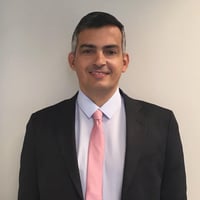César da Rocha Neves, PhD , is Head of the Business Conduct Monitoring Department of the Brazilian Insurance Supervisory Authority (SUSEP) and a Professor of Actuarial Science at Rio de Janeiro State University and Rio de Janeiro Federal University (UFRJ) in Brazil.
 César holds a Ph.D. in Engineering from Pontifical Catholic University of Rio de Janeiro, a Master’s in Engineering from UFRJ in Brazil and a Cum Laude Bachelor’s in Actuarial Science degree from UFRJ. He is a member of Academic Central of The Casualty Actuarial Society (CAS) and a member of the Brazilian Academy of Insurance and Pensions (ANSP).
César holds a Ph.D. in Engineering from Pontifical Catholic University of Rio de Janeiro, a Master’s in Engineering from UFRJ in Brazil and a Cum Laude Bachelor’s in Actuarial Science degree from UFRJ. He is a member of Academic Central of The Casualty Actuarial Society (CAS) and a member of the Brazilian Academy of Insurance and Pensions (ANSP).
César is a specialist in risk modeling, products, regulation, solvency and longevity. He is the author of several technical articles published in international journals (Insurance: Mathematics & Economics, North American Actuarial Journal and Journal of Forecasting) and Brazilian journals and technical books in the area of solvency and actuarial science.
ACTEX Learning (AL): How many practicing actuaries do you have?
César da Rocha Neves (CN): We have around 2000 actuaries that are members of the Brazilian Institute of Actuaries. There are also actuaries working for the government and universities who are not members.
AL: What is the word for actuary in your local language?
CN: Atuário
AL: When was actuarial science first introduced?
CN: The first complete coursework in actuarial science was recognized in 1931 and the Brazilian Institute of Actuaries was founded in 1944.
AL: What is your favorite part about being an actuary?
CN: My preference is to develop risk measurement solutions using stochastic models as well as to develop new insurance products for life insurance and pensions.
AL: Do you have any advice for young people in your country interested in pursuing this career?
CN: My advice is to study a statistical program package, mainly R. A good plan is to be both an actuary and data scientist in the same time. I think that it is the future.
AL: What are some of the highlights of the history of the actuarial profession in your country?
CN: In Brazil, an actuary has to complete a degree in actuarial science. The duration of the coursework is 4 years. The first university to offer this was Rio de Janeiro Federal University (UFRJ). Now, in Brazil, 17 universities offer actuarial science degrees. When a student finishes the course, they have to pass an exam in order to be a member of Brazilian Institute of Actuaries.
AL: What developments on the horizon could affect future opportunities in your country?
CN: Currently, the new Brazilian government is discussing changes in the social pension plan. Therefore, this will be a great opportunity to develop annuities products in Brazil. Additionally, with the possibility of an increase in GDP, significant investments will return, which is a good opportunity to develop surety and property insurance.
AL: What have you seen from inside your company? Where do you think the changes to actuarial work in your country will happen in the next five years?
CN: Currently, I work for the Brazilian Insurance Supervisor- SUSEP. If the market increases, there will be an increased need for supervising actuaries also. I believe that more and more actuaries should participate in asset management for companies. In addition, actuaries should be implementing data science and machine learning techniques for pricing and reserving.
AL: Who are the main employers of actuaries?
CN: Insurers, Reinsurers, Pension Funds, Consultants and the Federal Government.
AL: What qualifications do you find most important for upcoming actuaries?
CN: I believe that actuaries have to know statistics, finance and statistical software programming.
AL: Do employers support the cost and time of exam preparation?
CN: In general, students pass their exam before becoming an employee. Nevertheless, it is possible that the company may pay for the exam for an employee. The cost is not significant.
AL: Are there any noteworthy non-traditional actuarial positions?
CN: No, there aren’t.
AL: What is your favorite Excel function and why?
CN: None, I usually use R packages.
AL: Do you have any non-actuarial hobbies?
CN: I like to watch my soccer team’s (Flamengo) games, play soccer and to go to the beach.
AL: What could people from outside of your country do to help the profession grow in Brazil?
CN: I think the best way to do this is to invite Brazilian actuaries to international congresses.

